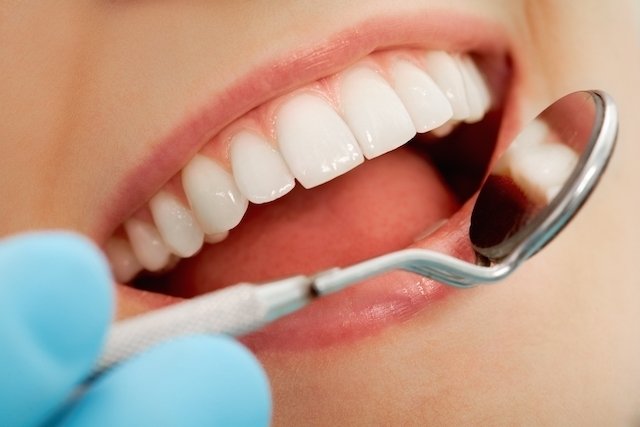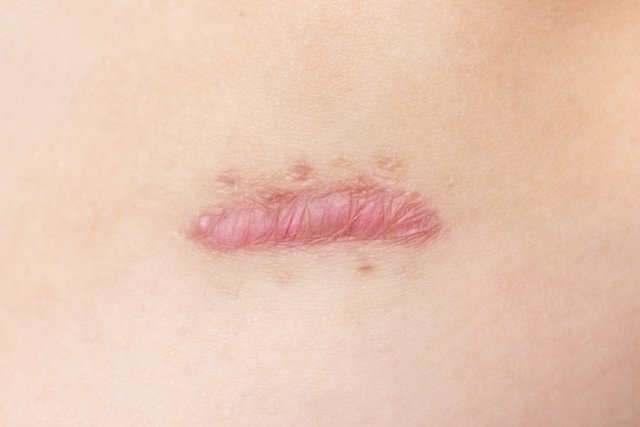Mixing baking soda with lemon has become increasingly popular, especially because there are reports that this mixture can help with some aesthetic issues, such as whitening teeth or removing scars, leaving the skin more beautiful.
In addition, the mixture of baking soda and lemon has also gained popularity as a home remedy to relieve reflux symptoms, especially stomach pain and constant heartburn.
However, there are few scientific studies carried out with the mixture that can prove these benefits. Therefore, based on lemon and bicarbonate individually, we explain the possible effect of these ingredients for each of the most common uses:
1. Whiten your teeth

Several studies carried out with sodium bicarbonate in oral health show that the substance is capable of eliminating excess bacteria in the mouth, reducing plaque and, consequently, leaving teeth whiter.
Furthermore, an investigation carried out in 2017 with toothpastes that contained sodium bicarbonate in the composition also concluded that these pastes were capable of eliminating surface stains on teeth due to the presence of bicarbonate.
In the case of lemon, a study carried out in 2015 demonstrated that lemon has acids that are capable of destroying tooth enamel, increasing the risk of tooth sensitivity and the appearance of cavities.
Conclusion
Although there is no study that evaluates the effect of mixing bicarbonate with lemon on tooth health, its use is not recommended, especially due to the risks of applying lemon to teeth. The ideal is to consult a dentist for professional whitening.
See more about the main teeth whitening options.
2. Relieve reflux and heartburn

Due to its basic pH of 9, bicarbonate is a substance that has been shown to be capable of increasing the pH of gastric contents, making it less acidic. In this way, the substance can help alleviate the typical symptoms of reflux, which occur when the contents of the stomach reach the esophagus.
Lemon has an acidic pH of 2, which, although it is a higher pH than that of gastric contents, which is 1.2, is not enough to neutralize the acid and alleviate symptoms. Even so, there are some pharmacy antacids that combine bicarbonate with lemon, because, when combined, these ingredients produce sodium citrate, a substance that prevents very sudden changes in the pH of the stomach.
Conclusion
Some antacids contain bicarbonate and lemon in their composition, but this combination is made in a laboratory with very exact quantities of each ingredient. Since it is difficult to correctly measure these ingredients at home, so as not to add more lemon than indicated, it is advisable to use a pharmacy antacid instead of mixing lemon with bicarbonate.
This is because if the mixture contains a greater amount of bicarbonate it can leave the stomach with a very basic pH, which makes digestion difficult and increases the formation of gas. If the mixture contains a very large amount of lemon, the pH may remain acidic, not relieving the symptoms.
Check out some proven home remedies to relieve heartburn.
3. Remove scars

Lemon is an ingredient that contains natural acids, such as vitamin C, which is widely used in the composition of some creams. peeling to remove the top layer of skin and help disguise scars. However, when used in its natural form, and without other ingredients mixed in the laboratory, vitamin C cannot be correctly absorbed by the skin and, therefore, does not produce a correct effect. peeling.
Furthermore, if used in excessive amounts, lemon juice can cause changes in the skin’s pH, making it more acidic. When this happens, the skin tends to stain or become irritated, in addition to increasing sensitivity to UV rays, which increases the risk of skin burns.
As for bicarbonate, there are no studies that demonstrate its beneficial action on the skin. However, as it has a basic pH, it can also influence the skin’s pH balance, increasing the risk of dryness and even increased oiliness.
Conclusion
To remove scars from the skin, it is important to consult a dermatologist, as this doctor will be able to assess the type of scar and recommend the best treatment available, which may not include the use of a peeling. However, even if the peeling If indicated, the ideal is to use products with a pH that does not harm the skin.
See 5 treatments recommended to remove scars from the skin.
Bibliography
- CAMPOS, Patrícia MBG Maia et al.. In vitro antioxidant activity and in vivo efficacy of topical formulations containing vitamin C and its derivatives studied by non-invasive methods. Skin Research and Technology. Vol.14, n.3. 376-380, 2008
- YIMMING, Li. Stain removal and whitening by baking soda dentifrice: A review of literature. The Journal of the American Dental Association. Vol.148, n.11. S20-S26, 2017
- PANDA, Vandana et al.. A comparative study of the antacid effect of some commonly consumed foods for hyperacidity in an artificial stomach model. Complementary Therapies in Medicine. Vol.34. 111-115, 2017
- ZIMMER, Stefan et al. Influence of Various Acidic Beverages on Tooth Erosion. Evaluation by a New Method. Plos One. Vol.10, n.6. 2015
- PUTT, Mark S. et al.. Enhancement of plaque removal efficacy by tooth brushing with baking soda dentifrices: results of five clinical studies. The Journal of Clinical Dentistry. Vol.19, n.4. 111-119, 2008

Sign up for our newsletter and stay up to date with exclusive news
that can transform your routine!
Warning: Undefined array key "title" in /home/storelat/public_html/wp-content/plugins/link-whisper-premium/templates/frontend/related-posts.php on line 12
Warning: Undefined array key "title_tag" in /home/storelat/public_html/wp-content/plugins/link-whisper-premium/templates/frontend/related-posts.php on line 13



